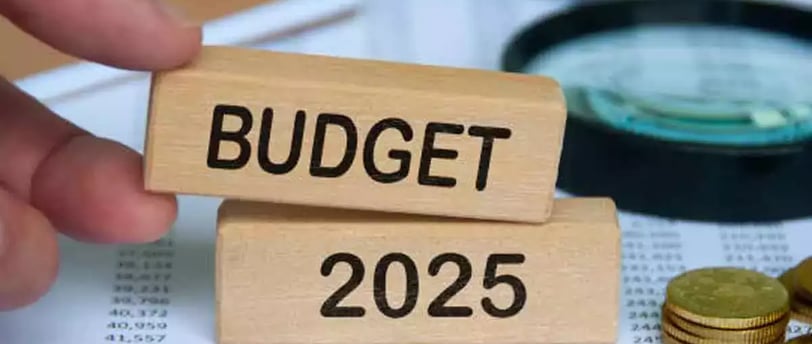Add your promotional text...
Budget 2025-26: Taxpayers’ Expectations and Key Reforms Needed for Greater Financial Relief
Synopsis: As Budget 2025-26 approaches, a recent survey by Grant Thornton Bharat reveals a strong demand for personal tax relief among individual taxpayers. From reduced tax rates and higher exemptions to improved compliance systems and incentives for electric vehicles, taxpayers are voicing key expectations that could shape financial policies.
VIEWS ON NEWS
By Monika Agarwal
1/27/20253 min read


The Union Budget 2025-26, to be presented by Finance Minister Nirmala Sitharaman on February 1, has created a buzz among taxpayers. A pre-budget survey conducted by Grant Thornton Bharat highlights the pressing concerns and expectations of individual taxpayers. With a focus on personal tax relief, simplified compliance, and incentives for sustainable practices, taxpayers are looking forward to reforms that will enhance their disposable income and streamline tax processes.
Demand for Personal Tax Relief
The survey indicates that a significant portion of taxpayers seek relief on the personal tax front. Among the respondents, 57% demand lower tax rates, while 25% advocate for higher exemption limits. These reforms would not only increase disposable income but also provide much-needed financial relief to the middle class.
The findings also reveal a growing preference for the new personal tax regime, with 72% of taxpayers opting for this simplified system. However, to make the new regime more appealing, 46% of respondents suggest further reductions in tax rates, and 26% call for higher exemption limits.
Interestingly, despite the government's plans to phase out the old tax regime, 63% of taxpayers still support increased incentives under the older system. This reflects a continued reliance on traditional tax-saving avenues, even as the new regime gains traction.
Enhancing Tax Compliance and Filing Efficiency
With digitalisation transforming financial systems, taxpayers are seeking more efficient tax compliance mechanisms. The survey underscores several key reforms:
Ease for NRIs and Overseas Taxpayers:
38% of respondents emphasize the need to allow tax payments through foreign banks, which would simplify compliance for Non-Resident Indians (NRIs).
Improved operational mechanisms for tax refunds to overseas banks.
Enhanced e-verification systems, including the ability to send OTPs to foreign mobile numbers.
Domestic Compliance Adjustments:
56% of respondents propose raising the income threshold for mandatory tax filing to ease the burden on small taxpayers.
32% call for a reduction in additional tax on updated returns, while 12% advocate for extending the timeline for filing revised Income Tax Returns (ITRs).
These changes would streamline tax compliance processes and make them less cumbersome for individuals, particularly those living abroad.
Reforming the National Pension Scheme (NPS)
The National Pension Scheme (NPS) is another area where taxpayers expect changes. 53% of respondents urge the government to introduce more flexible withdrawal rules and enhance tax exemptions for premature withdrawals or annuity payouts. These adjustments would make the NPS more attractive, encouraging greater participation and ensuring long-term financial stability for individuals.
Promoting Sustainability Through EV Incentives
The survey also highlights taxpayers’ desire for the reintroduction of tax incentives to promote the adoption of electric vehicles (EVs). Previously, the government offered tax deductions on interest payments for loans taken to purchase EVs, but this benefit was limited to loans sanctioned between April 1, 2019, and March 31, 2023. Reintroducing such incentives would not only drive the transition to sustainable energy but also align with India’s environmental goals.
Key Expectations for Budget 2025-26
To summarise, taxpayers have voiced several critical expectations for the upcoming budget:
Lower tax rates and higher exemption limits to provide financial relief and increase disposable income.
Enhanced tax compliance mechanisms, especially for NRIs, including foreign bank payments and OTP-based e-verification for overseas taxpayers.
Simplified domestic compliance, with higher income thresholds for mandatory filing and reduced penalties for updated returns.
Flexibility in NPS withdrawals and higher tax exemptions to ensure long-term financial security.
Reintroduction of tax incentives for EVs to encourage sustainable practices and adoption of green technologies.
In conclusion, The Union Budget 2025-26 offers an opportunity for the government to address taxpayers' concerns and introduce reforms that foster financial inclusion, sustainability, and ease of compliance. By implementing measures such as lower tax rates, enhanced NPS benefits, and incentives for EV adoption, the government can support individual taxpayers while driving long-term economic growth. As taxpayers eagerly await the budget, the hope remains that their expectations will translate into impactful policies.
